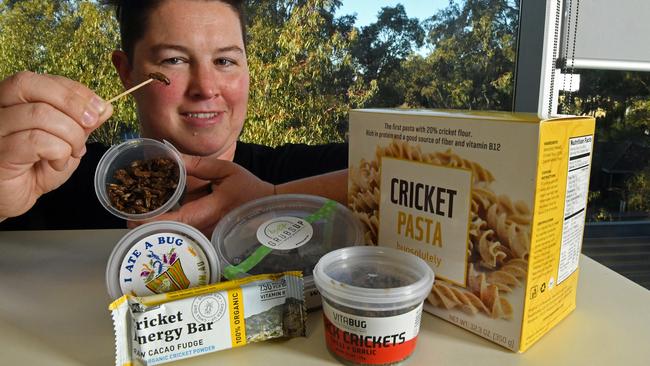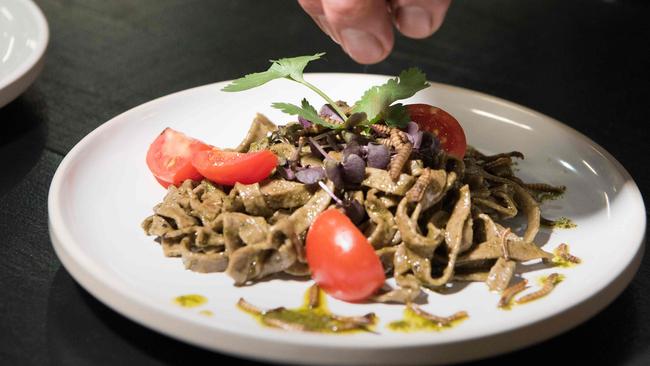Adelaide University, CSIRO sink their teeth into the bug-eating business
Will Australia have the stomach to take a bite out of global edible insect industry? Local researchers and bug believers say it could open a smorgasbord of business opportunities.

Fancy a fried fly, roasted roach, or minced mealworm?
Australians may be a little late to the edible insect party, which overseas estimates suggest will be worth billions of dollars in years to come but we have a smorgasbord of snacks and tasty treats to offer the world.
We just need to gear up the local food industry for commercial production.
The University of Adelaide is working with CSIRO to find the best candidate critters in the national collection and create new opportunities.
But there are already some products on the market.
Professor Kerry Wilkinson says she quite likes the taste of green ants, either fresh or dehydrated, and doesn’t mind roasted crickets, though the legs tend to get suck in her teeth. Mealworms are better, because they have a “pleasant nutty flavour that works well with breads, biscuits, cornchips and pasta”.
“In our heads, we kind of think of insects as being squishy and disgusting, but that’s not how we’d be eating them,” she said.
“Get beyond that and think about having them roasted, or turned into flour for crunchy things.”
And there are nutritional benefits, as insects are packed with protein and often other nutrients. Crickets, for instance, are a great source of iron.
Farming insects is also far better for the environment than raising animals for meat, because insects need less water and less land than livestock, while also producing less waste and greenhouse gas emissions.
Insects can even consume food waste, doing the dirty job of recycling for us while also producing a new protein-rich food source and fertiliser (poo).
Prof Wilkinson is excited about the potential to make a big contribution to solving some of the world’s biggest problems, from food security to waste, using insects.
But her survey showed most “people are more interested in what it looks like, what it tastes like and is it safe to eat”.
The online survey of 820 consumers found that 68 per cent of participants had heard of edible insects but only 21 per cent had previously eaten insects; witchetty grubs, ants, grasshoppers, and crickets were most commonly tasted.
Taste, appearance, safety, and quality were most likely to influence willingness to try eating insects, rather than environmental or sustainability reasons.
Consumers were more willing to try foods made from insects or meals that incorporate insects, rather than whole insects.

Prof Wilkinson will lead research to identify and sample Australia’s unique edible insect species using the CSIRO Australian National Insect Collection, Atlas of Living Australia and consultation with Indigenous communities.
The plan is to determine the nutritional profiles and suitability of edible insect candidates; optimise the growing conditions and assess the feasibility of edible insect candidates for upscaled commercial farming with Canberra-based start up company Goterra; and conduct food science research to examine the chemical composition of edible insect candidates to potentially develop novel foods.
CSIRO entomologist Dr Bryan Lessard says the UN estimates the global edible insect market will be worth $1.5 billion in the next four years.
“Australia has some amazing insects that are found nowhere else in the world, like the green ant and the honey ant, which is sweet and delicious,” he said.
“We could potentially create new products that are used all over the world.”
Later this month, CSIRO will host an international symposium on edible insects, and begin work on an industry road map to identify unique Australian opportunities to grow a local insect industry.
Another aspect of the growing insect industry is food-waste management.
Goterra founder and chief executive Olympia Yarger describes herself as a “maggot farmer”. She is using insects to chew through food waste from households, hospitals, hotels, office buildings and schools in Canberra. The operation is now poised to expand into NSW and Queensland.
It’s “modular technology”, essentially shipping containers full of black soldier fly maggots eating their way through five tonnes of food waste every day.
The end product is manure, which makes great fertiliser and mature larvae for livestock feed, which “smells sweet and palatable”. “We were inspired to start the business out of passion for insects and a belief in harnessing them to work for us, whether that’s as a source of food with edible insects, or to process food waste using larvae,” Ms Yarger said.
“Our solution is focused on technology to create opportunities to use insects as a biological service. We’re building the technology to breed the insects and transport them to wherever there is a need, creating a mobile and versatile alternative to everything from sources of protein to landfill.”

